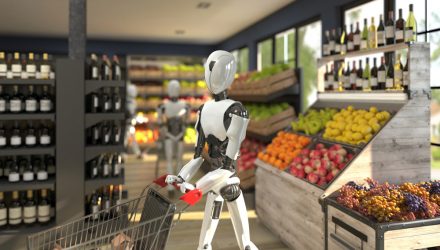Go to any grocery store and consumers have to feel like it’s a battle zone—the mad dash for goods is not only a frenetic endeavor for the consumer, but it also exposes them to coronavirus risk. The same goes for grocery store workers, which is why robots are coming to the rescue.
Grocery stores like Broad Branch Market in Washington, D.C. are using robots to make grocery deliveries to customers.
“There’s strong interest in moving rapidly in this direction because everyone knows they need to raise their game to stay competitive and it’s ultimately more cost-effective to automate than staff up, especially in today’s labor market,” said Bill Bishop, co-founder of retail and grocery consulting firm Brick Meets Click.
In addition, companies like Brain Corporation are supplying robots that can scrub floors to grocery stores. The company itself saw a 13% jump in robot usage during the month of March.
“I strongly believe that the current health crisis will accelerate the adoption of robots in retail,” said Steven Keith Platt, research director for the Retail Analytics Council and adjunct professor at Northwestern University. “Short-term, this is to address health concerns” with regard to workers and customers where robots will do the stocking and food preparation.
Investors looking for a broad ETF play in disruptive technology can look at the ARK Innovation ETF (NYSEArca: ARKK). The actively-managed ETF seeks to provide investors with:
- Exposure to Innovation: Aims for thematic multi-cap exposure to innovation across sectors. ARK believes the securities held in ARKK present the best risk-reward opportunities from ARK’s innovation-based themes.
- Growth Potential: Aims to capture long-term alpha+ with a low correlation of relative returns to traditional growth strategies and negative correlation to value strategies.
- Diversification: Offers a tool for diversification due to little overlap with traditional indices. It can be a complement to traditional value/growth strategies.
- Research: Combines top-down and bottom-up research in its portfolio management to identify innovative companies and convergence across markets.
- Cost-Effectiveness: Provides a lower-cost alternative to mutual funds with true active management in an Exchange Traded Fund (ETF) that invests in rapidly moving themes.
Driving the Data of Tomorrow
Another fund to get exposure to disruption via data-driven technology is Goldman Sachs Motif Data-Driven World ETF (GDAT). The fund seeks to provide investment results that closely correspond to the performance of the Motif Data-Driven World Index, which is designed to deliver exposure to companies with common equity securities listed on exchanges in certain developed markets that may benefit from the on-going rapid increase in electronically recorded data in the world and its impact on the lifecycle of data delivery and processing.
GDAT essentially provides exposure to the beneficiaries of technological innovation, regardless of sector, geography or market capitalization. They can be used individually or collectively to help investors position their portfolios for the future.
For more market trends, visit ETF Trends.








